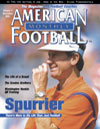AMERICAN FOOTBALL MONTHLY THE #1 RESOURCE FOR FOOTBALL COACHES
Article CategoriesAFM Magazine
|
Balance : Steve SpurrierSteve Spurrier keeps football in its proper place in his life, and florida on top of the pollsby: Richard Scott © More from this issue Nearly every coach would like Steve Spurrier's recruiting base in Florida and the talent on his roster. Almost any coach would covet Spurrier's financial resources and facilities. A majority of coaches would give their left ... pinkie toes ... to have Florida's fervent fan support and outstanding administrative backing. With all those advantages going for Spurrier and the University of Florida football program, winning ought to be easy, right? Now ask yourself this: would every coach produce the same success Spurrier has achieved in his 12 seasons at Florida? If it's so easy to win at Florida, why is Spurrier the only Gator coach to win a national championship? Heck, for that matter, why is he only the second Gator coach to win an SEC championship? Even then, Spurrier is the only Florida coach to win an official SEC title, since ....The full article can only be seen by subscribers.
|
|
|||||||
| HOME |
MAGAZINE |
SUBSCRIBE | ONLINE COLUMNISTS | COACHING VIDEOS |
Copyright 2025, AmericanFootballMonthly.com
All Rights Reserved





